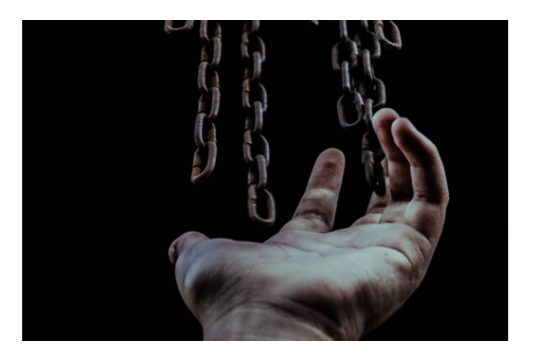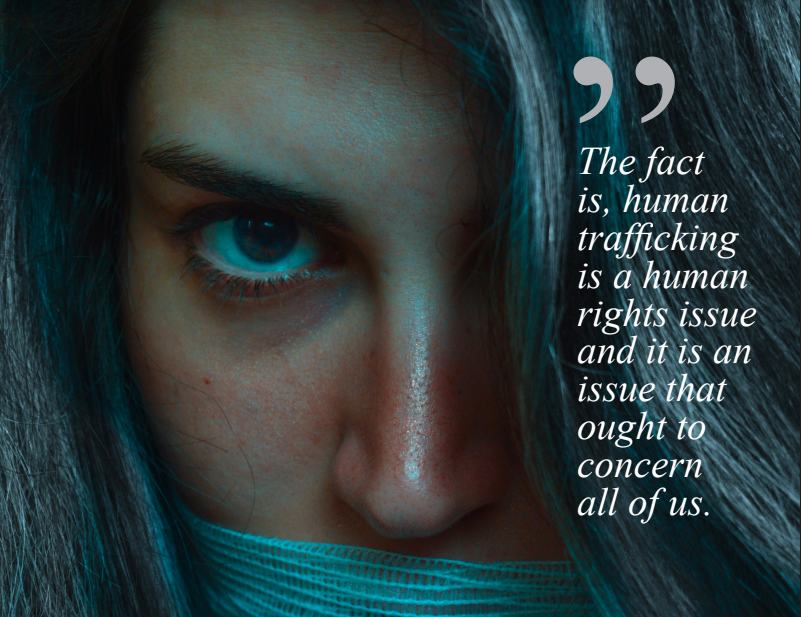Marva Mortley
Staff Writer
I moved to Atlanta, Georgia in 2014. One year later I was still looking for a good-paying job. I was on my own and struggling financially. I couldn’t afford an internet bill so I went to McDonald’s to use the free Wi-Fi while applying for jobs. One day, a young lady and I struck up a conversation while she waited for her boyfriend. She shared that she was out of school because she could not afford tuition. As a result, she was living with some people to help cover her rent. I asked about her family. They did not know that she wasn’t in school. I encouraged her to contact them. I also told her that some restaurants have a special program that would give her transportation fare to get home.
The ‘boyfriend’ came about 6 to 7 hours later. She went to the restroom. On her return I asked her, “Where are you going, putting on makeup at this time of the night; to do what? I know I would be going home!” She smiled a sad smile, shrugged her shoulders and gave me a small, almost shy, childish wave. Looking back on that encounter and based on my research and recent awareness, I believe I met my first human trafficking victim.
Human trafficking is estimated to be a $150 billion industry across the globe. Broadly speaking, human trafficking falls into three main areas. The first is sex trafficking. Then there is servitude or labor trafficking. The third is the trafficking of people for body parts. The business of human trafficking is about stealing an individual’s freedom; subjugating and manipulating them “by force, fraud or coercion” to serve the purposes of the perpetrator for profit.
In 2016 the International Labor Organization [ILO] reported that an estimated 40.3 million people are victimized by human trafficking across the globe. 29 million are reportedly women. The United Nations Office on Drugs and Crime (UNODC) reported in February 2009 that trafficking sex slaves rank the highest in exploitation. It is followed by trafficking for purposes of exploiting labor. 20% of the exploited are children. Stereo-typical images of evil, ugly men profiting from this soul-destroying activity is not the complete picture. The report also found that 30% of those who do the exploiting are women enslaving women.
The top 10 states for trafficking in the United States are California, Texas, Florida, Ohio, New York, Michigan, Nevada, Georgia, Illinois and Pennsylvania. Trafficked individuals are forced to work long, hard hours. Often, they are used to provide a legitimate service to an unaware general populace. Through fraud, coercion or cooperation for profit, perpetrators place people in such industries as agriculture, domestic services, restaurants, cleaning services and hotels.
Sex trafficking is defined by the amended Trafficking Victims Protection Act of 2000 as “the recruitment, harboring, transportation, provision, obtaining, patronizing, or soliciting of a person for the purpose of a commercial sex act.” In practice, it falls under the much larger umbrella of commercial sex. Some of these ventures operate as legitimate businesses in areas such as adult film productions. However, many other businesses profit from trafficked individuals – think shady escort services, illicit massage businesses, brothels and pornography.
With this horror going on around us, how can we begin to identify victims of the human slave trade today? According to the US Department of State, some signs to look for if your suspicion is aroused are the following:
- The individual lives with the employer.
- There are too many people living together in a small space.
- When you ask questions, the answers sound scripted and rehearsed.
- Individuals report little or no communication with family or friends.
- Their identity documents are strictly secured by the employer.
- Signs of physical abuse.
- The ‘employee’ shows signs of submissiveness or fearfulness.
- The individual is under 18 years old and involved with prostitution
Atlanta, Georgia has been identified as one of the leading cities in the operation of Human Trafficking in the USA. This is due largely to its central location as a transportation hub both national and international. The city has four major Interstates that run through it, one of the world’s largest, busiest international airports, and it boasts a plethora of big national and international high volume traffic events happening every year. The Atlanta calendar of events website shows around 23 categories of events. As recently as May 30th, the International Human Trafficking Institute [IHTI], in their ‘social media take-over’ campaign reminded us that “there are at least 100 children under the age of 16 sold on the streets of Atlanta on any given night.” So what is Georgia doing to stamp out this vile trade in human misery taking place in its borders?

In January 2018, in partnership with the City of Atlanta, FBI, and Atlanta Super Bowl Host Committee, IHTI, an initiative of the National Center for Civil and Human Rights invited representatives from business, government, anti-human trafficking organizations, advocacy, civic, faith, and philanthropic entities to form the Metro-Atlanta Human Trafficking Coalition. The purpose of this gathering was the creation of a multi-sector all-encompassing strategy to tackle Atlanta’s horrific human trafficking problem. The 3-year Initiative aims to raise awareness and end trafficking. One stated goal is to raise $1million in support of anti-trafficking efforts such as training 50,000 people in business, transportation, hospitality, institutions of education and civic groups to detect human trafficking and/or work to prevent demand.
The Executive Director of IHTI, Mrs. Deborah Richardson, explains; “In the late 1990s, former Fulton Commissioner, Nancy Boxill, former Atlanta Women’s Foundation CEO, Stephanie Davis, current City Attorney Nina R. Hickson, and current Fulton County Attorney Patrise Perkins-Hooker, and I coalesced to create the first advocacy campaign in Georgia to address domestic child sexual exploitation. Our fury was propelled by seeing children as young as 10 years old sold for sex and then charged with Child Prostitution. Our first demand called for juvenile justice, child welfare, and media to immediately cease labeling these young victims as child prostitutes.
Today we all recognize that these children, girls and boys, are sexually exploited. Why are men who buy sex to rape young children called Buyers or Johns? You and I are buyers of groceries, gas, and clothing. John is the name of many good men who are staunch advocates in ending child sexual exploitation. We now need to demand that we call the person who exploits children what he is– a Predator. A predator is a person or group that ruthlessly exploits others. Men purposely seeking and deliberately exploiting our children are absolutely Predators. It’s Time to Call Him What He Is.”
Georgia’s First Lady, Marty Kemp, is leading the GRACE Commission in another initiative to focus study and research on ways to stop human trafficking before victims are caught in its deadly web of operation. Major business leaders in Georgia, trafficking non-profits, and law enforcement are part of the Commission. First Lady Marty Kemp explained the driving force for her involvement, “It’s in our backyard. Its affected people close to me.”
Atlanta is also using every legal means at its disposal to combat this horrific plague. In 2011 and 2013, legislation was passed that imposes an obligation on certain businesses to post a notice for victims of human trafficking to obtain help and services. There are Fines for failure to post these notices. Senate Bill of Georgia S.1311 – Abolish Human Trafficking Act 2017 also lay down a variety of measures to deal with the prevention and punishment of human trafficking. It mandated the provision of assistance to trafficked victims. The Act further requires all government buildings and websites, as well as state agencies to post notices of human trafficking hotline phone numbers along with contact details of the National Human Trafficking Resource Center and Georgia Cares.
Finally, I hope that more and more people become aware of the Blue Campaign National Awareness Day for human trafficking. It is January 11th each year. The campaign works in partnerships with government, non-government, private sector, law enforcement, state and local authorities to increase national public engagement on anti-human trafficking actions. Supporters and advocates are encouraged to wear something blue, take a picture, and post it on social media to draw as much attention as possible to the plight of victims and this repulsive business.
This year, Delta Airlines supported Wear Blue Day at their 3rd annual Get-On-Board Event with Mayor Keisha Bottoms of Atlanta in attendance. They produced and promoted a commercial which featured how a victim can get help from a stranger while on a plane. The company shared research data that 71% of human trafficking victims are transported by plane. It is almost incomprehensible how this is even possible. The fact is, human trafficking is a human rights issue and it is an issue that ought to concern all of us.
They say hindsight is 20/20 vision. Knowing what I know today, I would have tried harder to help the young lady I met at the McDonald’s restaurant in 2014. At the very least, I would have pointed her in the direction of a specific source of help and support like the Salvation Army of Metro-Atlanta, Haven-ATL. In 2012, the organization began helping victims escape, recover and lead healthy, prosperous lives.
In view of the stark reality that this form of modern-day slavery is happening right under our noses on such a grand scale, do not be surprised that someday you may have an opportunity to raise the alarm or point someone to a safe haven. If that ever happens, remember to watch out for your safety too. The perpetrators of human trafficking will resort to violence when their business is threatened. Call the National Human Trafficking Hotline Resource Center at 1-888-373-7888 if you have any suspicions. Or, contact Georgia Cares at 1-844-842-3678 – they provide treatment and care for sexually exploited victims whether a child or an adult. And of course, you can always call 911 in cases of emergency.

